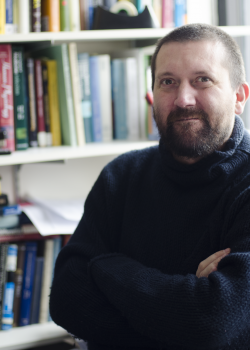
Photo credit: Shutterstock.
UM mathematician Julien Arino receives Radio-Canada Scientist of the Year Prize
Dr. Julien Arino, in the Department of Mathematics, is one of four mathematicians awarded the CBC Radio-Canada Scientist of the Year 2020 prize for his work in modelling the COVID-19 pandemic.
Dean Stefi Baum, Faculty of Science expands on the significance of the research, “We are justifiably proud of Julien Arino for the critical contributions he has made through the application of mathematical modelling to epidemiology, allowing him and the team to address, in a timely manner, critical questions about the spread and containment of COVID-19 during this pandemic. His work is an excellent illustration of the critical contributions of mathematics to society and should inspire students to embrace both the beauty and the utility of maths.”
Sunday, January 17, 2021 – Radio-Canada is pleased and proud to announce that it is awarding its “SCIENTIFIQUE DE L’ANNÉE 2020 DE RADIO-CANADA” prize to Julien Arino, Marc Brisson, Caroline Colijn and Mathieu Maheu-Giroux, representatives of Canadian data modelling teams whose work has supported, informed and guided decision-making by public-health bodies and governments relative to management of the COVID-19 pandemic response.
Scientists across the country have developed mathematical models to simulate and/or predict the spread of the epidemic. Their epidemiological modelling has enabled governments and public-health bodies to forecast the various scenarios and the likely consequences of their decisions. Policy-makers have in turn used those models to build their pandemic response in an effort to reduce mortality, safeguard health-care systems and minimize social disruption.
The four winners represent the modelling community. They are specialized in different areas, are based in different regions and have addressed the challenges of the pandemic from different angles, and are continuing to advise public-health and government policy-makers. The pandemic has led them to evolve their research areas at lightning speed since the data collected power their models and help refine them. Their work in turn has affected the evolution of the pandemic via the measures adopted.
Data modellers have been working behind the scenes, attuned to the virus and in action, since late 2019. They are closely observing data on people’s health and behaviours, alert to the latest developments in basic science, and committed to improving pandemic response. They are powering much more than their models.
Radio-Canada Executive Vice-President Michel Bissonnette hailed the importance of their work. “Understanding how a virus spreads through populations has never been so important. This vital work being done by teams of scientists is enriching both science and society, and that is what we sought to acknowledge in awarding them Scientist of the Year honours,” he said.

Julien Arino, Professor, Department of Mathematics.
Julien Arino earned his PhD at INRIA (France’s National Institute for Research in Computer Science and Automation). He teaches at the University of Manitoba Faculty of Mathematics, where he is a participant in the Data Science NEXUS multidisciplinary program as well as the VADA (Visual and Automated Disease Analytics) graduate studies program. He is particularly interested in the risk of virus importation.






